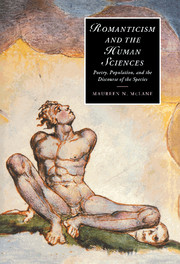Book contents
- Frontmatter
- Contents
- Acknowledgments
- Introduction, or the thing at hand
- Chapter 1 Toward an anthropologic: poetry, literature, and the discourse of the species
- Chapter 2 Do rustics think?: Wordsworth, Coleridge, and the problem of a “human diction”
- Chapter 3 Literate species: populations, “humanities,” and the specific failure of literature in Frankenstein
- Chapter 4 The “arithmetic of futurity”: poetry, population, and the structure of the future
- Chapter 5 Dead poets and other romantic populations: immortality and its discontents
- Epilogue: Immortality interminable: the use of poetry for life
- Notes
- Bibliography
- Index
- CAMBRIDGE STUDIES IN ROMANTICISM
Chapter 3 - Literate species: populations, “humanities,” and the specific failure of literature in Frankenstein
Published online by Cambridge University Press: 22 September 2009
- Frontmatter
- Contents
- Acknowledgments
- Introduction, or the thing at hand
- Chapter 1 Toward an anthropologic: poetry, literature, and the discourse of the species
- Chapter 2 Do rustics think?: Wordsworth, Coleridge, and the problem of a “human diction”
- Chapter 3 Literate species: populations, “humanities,” and the specific failure of literature in Frankenstein
- Chapter 4 The “arithmetic of futurity”: poetry, population, and the structure of the future
- Chapter 5 Dead poets and other romantic populations: immortality and its discontents
- Epilogue: Immortality interminable: the use of poetry for life
- Notes
- Bibliography
- Index
- CAMBRIDGE STUDIES IN ROMANTICISM
Summary
When one is studying man, what can be more exact or more rigorous than to recognize human properties in him?
Jean-Paul Sartre, Search for a Method… I began the creation of a human being.
Victor FrankensteinIn his 1797 essay “Of an Early Taste for Reading,” William Godwin announced that “Literature, taken in all its bearings, forms the grand line of demarcation between the human and the animal kingdoms.” Mary Shelley's Frankenstein, or The Modern Prometheus – boldly dedicated to “WILLIAM GODWIN, Author of Political Justice, Caleb Williams, &c.” – may be read as a critique of her father's pronouncement. Shelley's corporeally indeterminate but eccentrically literate monster asks us to consider whether literature – taken in all its bearings – was or is indeed a useful “line of demarcation between” human and animal. The fate of the monster suggests that proficiency in “the art of language” (110), as he calls it, may not ensure one's position as a member of the “human kingdom.” Shelley shows us how a literary education, so crucial to Godwinian perfectibility, presupposes not merely an educable subject but a human being. Read through Godwin's dictum, the trajectory of Frankenstein's creature offers a parable of pedagogic failure – specifically a failure in the promise of the humanities, in letters as a route to humanization. The novel demonstrates, perhaps against itself, that acquisition of “literary refinement” fails to humanize the problematic body – the ever-unnamed monster.
- Type
- Chapter
- Information
- Romanticism and the Human SciencesPoetry, Population, and the Discourse of the Species, pp. 84 - 108Publisher: Cambridge University PressPrint publication year: 2000

